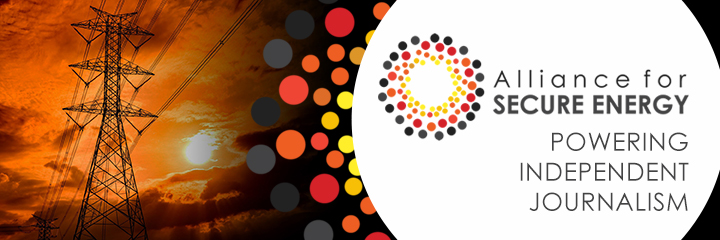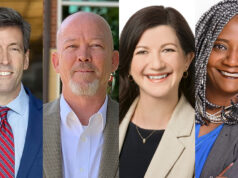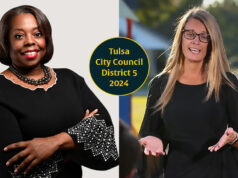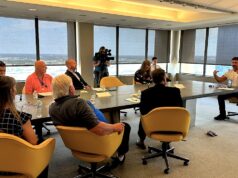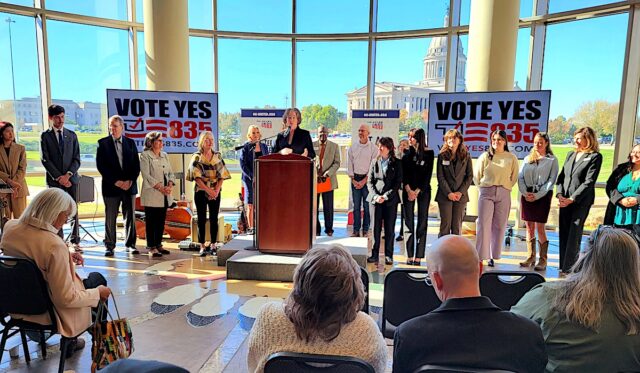
Every registered voter, regardless of political affiliation in Oklahoma, would have the ability to cast a vote in all contested state and county elections if an initiative petition effort announced Tuesday is successful and if voters approve the state question.
About 200 supporters of the proposal showed up Tuesday at the Oklahoma History Center to show their enthusiasm to eliminate Oklahoma’s closed primary system and replace it with an open primary. Backers said an open primary would improve voter turnout in a state that ranked last in voter participation in the Nov. 5 general election. While more Oklahoma voters cast a ballot for president this month than any previous election, the state’s turnout rate among its more than 2.4 million registered voters decreased.
“Oklahoma needs more voters voting, but we also have to give voters someone to vote for,” said Margaret Kobos, a Tulsa attorney who serves as CEO of Oklahoma United, a nonpartisan grassroots advocacy organization she founded four years ago.
Independent voters, which number about 480,000, are the fastest growing group of voters in Oklahoma, she said. In 1996, only 5 percent of the state’s voters were registered independents. Today, about 20 percent of registered voters are independent.
The Oklahoma Democratic Party has opened its primaries to independents, but the Oklahoma Republican Party and the Oklahoma Libertarian Party have not. As a result, independents are often excluded from voting in primaries.
“We need to fix that, and this petition does this,” Kobos said. “Even better, under the open primary proposal, we will guarantee that all Oklahoma voters will have a voice and the right to choose the best candidate for the job in every statewide race, regardless of whether you are registered, or the candidate is registered, Republican, Democratic, Libertarian or independent.”
Filed Monday with the Oklahoma Secretary of State’s Office, the proposed State Question 835 faces a challenge period even before signatures could be collected. If the signature threshold is met, Gov. Kevin Stitt would determine a statewide ballot on which to place it. If SQ 835 ultimately appears on a 2026 ballot, it would not affect that year’s gubernatorial election or other statewide, legislative and county contests. If passed, it would take effect 90 days later.
Under the Oklahoma United proposal, all candidates would run on one primary ballot with their party affiliation listed by their names. All registered voters, regardless of their parties, then vote for their preferred candidate. The two candidates receiving the most votes move to the general election, regardless of party affiliation. There would be no runoff elections.
The change would address a frequent complaint about elections in Oklahoma: Winners are often selected in primary contests where much of the electorate is ineligible to vote. For about 90 years of Oklahoma history, Democrats dominated the state, and many races were functionally decided in Democratic primaries. While Republicans now lead the state the way Democratic candidates once did, the criticism remains similar: Many elections are decided in a June GOP primary where Democrats, Libertarians and independents are ineligible to vote.
Officials with the Oklahoma Republican and Libertarian parties were quick to criticize the proposal.
“My thoughts are that this is an attempt to move the state to the left,” said Stan Stevens, executive director of the Oklahoma Republican Party, who attended Tuesday’s event. “It has nothing to do with voter participation.”
Chris Powell, chairman of the Oklahoma Libertarian Party, also attended Tuesday’s announcement and said the proposal resembles what he called a California-style top two system.
“It’s not a traditional open primary,” he said. “Sixteen states have traditional open primaries, including our neighbors in Arkansas and Texas, where a voter can go in and they can get whatever partisan primary ballot they want. That’s what ‘open primary’ means.”
Powell said he would prefer an open primary system similar to the setup in Louisiana, in which all the candidates are on the ballot and all registered voters can vote. Races in which no candidate receives more than 50 percent of the vote would be forced into a runoff election.
Oklahoma Democratic Party Chairwoman Alicia Andrews, contacted by phone, said she has not seen the proposal but is supportive of measures that grant voters more access to the ballot.
“I’m not convinced that this is it, I’m not convinced that it’s not,” she said. “But any conversation that sparks voter access, I’m here for it.”
States that have the highest voter participation have had conversations about different ways to make voter access quicker, easier and with fewer barriers, she said.
“The fact that, you know, they’ve pulled together a coalition — and it’s a bipartisan coalition, as I understand — that is looking at ways to increase voter participation, I am here for that,” Andrews said. “And I think it’s positive for our state.”
Proponents need nearly 173,000 signatures for SQ 835
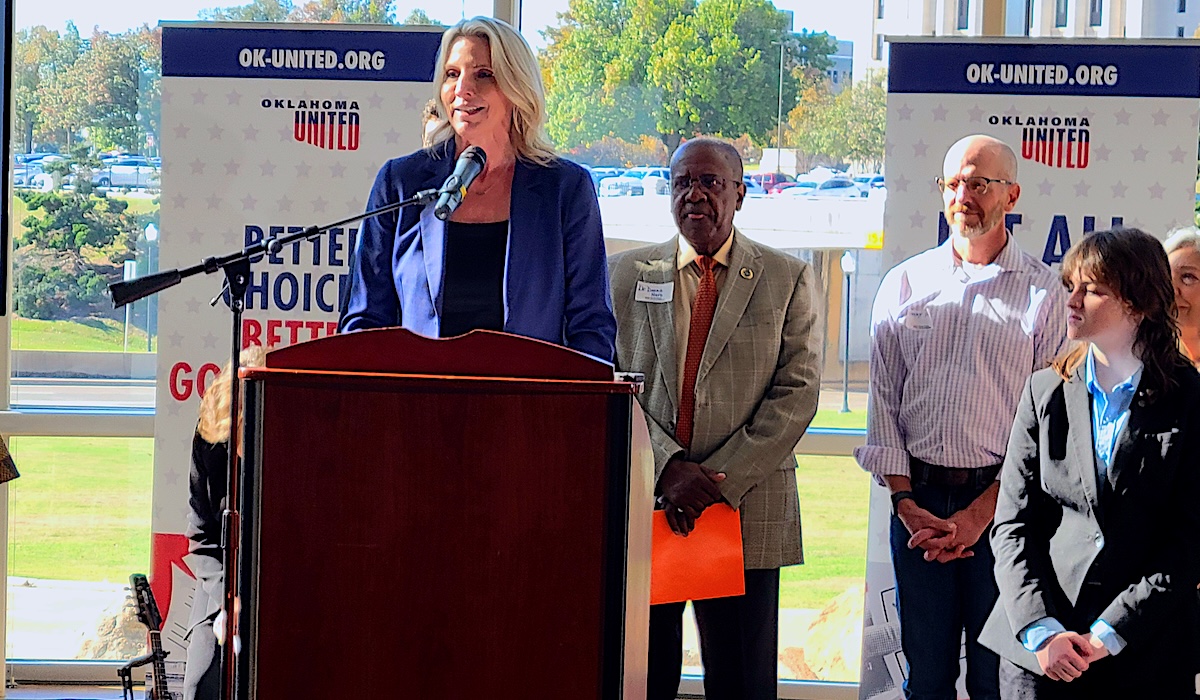
Under SQ 835’s proposed system, both candidates advancing from a primary could be Republicans, which some proponents of the idea believe would broaden the population to which Republican candidates must appeal when campaigning. AJ Griffin, CEO of the Potts Family Foundation and a former Republican state senator from Guthrie, said during Tuesday’s announcement that a unified primary ballot would encourage elected officials to engage with more of their constituents instead of focusing on voters only of their same party.
Oklahoma finished last in the nation in voter participation rates in November 2020 and again in this month’s general election.
“That’s indicative of something that is very wrong,” she said.
Voter participation is highest in the general election when, like this year, the president is on the ballot, and in the even years between presidential elections when the governor’s race is on the ballot, she said.
But many times, the outcome of other races are determined in the primary or runoff elections if the only viable candidates who file are Republican, she said.
This year, 86 percent of Oklahoma’s federal, state and county races either had no general election or a general election that was rendered meaningless because there were not two major party candidates on the ballot, Griffin said. Also, 69 of 101 races for seats in the Oklahoma House were not on the November ballot, because they were decided either on filing day or as a result of the primary process. In addition, only six of the 77 county sheriff posts were contested by members of both major parties, meaning a significant percentage of voters in 71 counties did not have a say in electing their sheriff.
As a result, meaningless general elections are a big reason why Oklahoma has such poor voter turnout, Griffin said.
Kobos said the SQ 835 petition will be the first to proceed under House Bill 1105 passed by the Legislature this year.
“It will be a learning process for all of us,” she said. “Protests periods are now twice as long as they were in the past, and we have no doubt that party insiders will file objections and challenges.”
The campaign committee in support of the effort will be “Vote Yes 835.” Once the Oklahoma secretary of state sets a start date, the committee will have 90 days to collect at least 172,993 valid signatures before it can be put to a vote of the people.
The petition was filed by:
- Anthony Stobbe, a 20-year veteran of the U.S. Coast Guard and registered independent from Edmond;
- Yvonne Galvan, a nonprofit worker and registered Democrat from Oklahoma City;
- and Kenneth Setter, a retired Tulsa pediatrician who is a registered Republican.
Kobos said the open primary system proposed by SQ 835 was modeled after Oklahoma’s municipal election system. The difference would be that while municipal elections are nonpartisan, open primaries under SQ 835 would require candidates to identify themselves by party affiliation or as independents.
In a press release issued by Oklahoma United, Oklahoma City Mayor David Holt, a former Republican state senator, is quoted as praising the proposal.
“Cities in Oklahoma like mine are known for our dynamic and effective governance, and the main reason is that we have an electoral system that allows everyone to vote,” Holt said. “Our voters get to see all the candidates and our candidates have to face all the voters. As a result, our leadership delivers unity and consensus outcomes that are clearly moving us forward. The entire state deserves that same level of success, and that’s why an open primary system for Oklahoma is so important and so valuable.”
Shortly after Tuesday’s event, A.J. Ferate, an Oklahoma City attorney and a former chairman of the Oklahoma Republican Party, criticized the proposal, saying that for more than 10 years Holt “has advanced legislation that would undermine our nation-leading election system.”
“He has called for same-day voter registration, mandatory statewide mail-only elections, and even the jungle ‘top two’ system he again proposes today in SQ 835,” Ferate tweeted. “The Democrat, Republican and Libertarian parties would each be harmed by the mayor’s proposal, and it must be refused by ballot voters.”
Lt. Gov. Matt Pinnell, a former Oklahoma Republican Party chairman and a former state party director at the Republican National Committee, also opposes the proposal.
“At best, the push to mandate open primaries is a solution in search of a problem, and at worst, it is a thinly veiled attempt to weaken Republican voters in choosing the nominees to represent our party,” Pinnell said in a press release. “Oklahoma is a conservative state, and Republicans hold all the statewide and federally elected positions and super majorities in the Legislature for a simple reason: Our values and principles represent the will of our state’s voters. Every county in Oklahoma voted for Donald Trump in November.”
Jonathan Small, president of the conservative think tank Oklahoma Council of Public Affairs, also issued a statement opposing the proposal.
“This effort to swindle Oklahomans into adopting California’s election system is being pushed by people whose bad ideas can’t win at the ballot box otherwise,” he said. “In the days to come, Oklahoma citizens will hear a lot of sob stories trying to con them into believing they are disenfranchised. The truth is that, in the most recent election, more Oklahomans cast ballots for president than ever before in our state’s history.”
Julie Knutson, president and CEO of The Oklahoma Academy, told those in attendance at Tuesday’s event that in 2017 the nonprofit group that deals with major public policy issues affecting the state listed open primaries as its top policy recommendation.
“The top priority issue was to move Oklahoma from a primary that is polarized to a top-tier, open primary system,” she said.
Donnie Nero, former president of Connors State College, said during Tuesday’s event that younger and rural Oklahomans are increasingly turned off by the closed primary system.
“I’ve seen the ways in which many feel disillusioned about the system that is in place,” he said. “Our young voters, those who are just starting out in this democratic process, they often feel that their voices don’t matter, especially in this closed primary system that we have in this state of Oklahoma. So, I want my former students — those who I pray that I got to once — I want them, and I want my grandchildren to understand that they can make a real change in the state of Oklahoma.”
Nero said the unified ballot would provide more enfranchisement to Oklahomans because it would allow every voter to vote in every election, even if no candidate from their party is running.
“It shows the young people that democracy really works in Oklahoma,” Nero said. “And right now, the closed primary system that we have is telling this whole generation that they really don’t matter, that their voices really don’t count, that they have no stake in the choices that affect their lives.”

